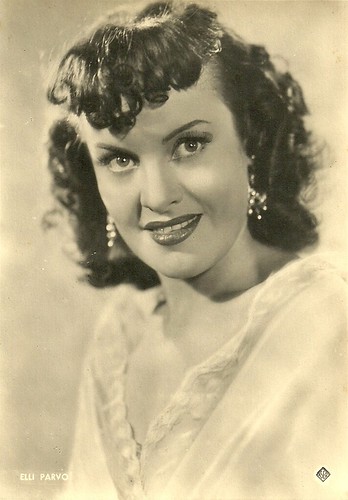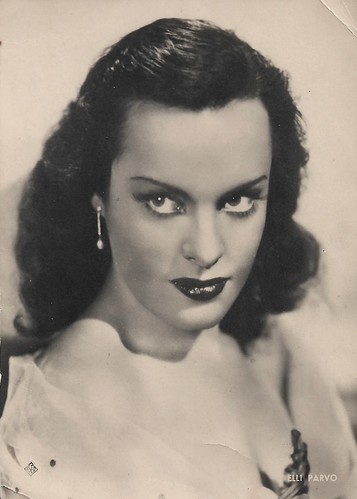Elli Parvo (1914–2010) was an Italian screen actress between the mid-1930s and 1960 and known as 'the woman men fight over' as in Desiderio (1943-1945) or 'the femme fatale' as in Il sole sorge ancora (1946).

Italian postcard by Ballerini & Fratini Editori, Florence, no. 2392. Photo: Generalcine.

Romanian postcard.
Elli Parvo, an anagram of her real name, Elvira Gobbo, was born in Milan in 1914. Her father was from Friuli, her mother from Berlin. Elli was educated in a Swiss school in her native town. She debuted at the age of 19 as an extra in the period piece Teresa Confalonieri / Loyalty of Love (1934) by Guido Brignone. Several bit parts followed.
From 1937, she also had major roles in Italian films, as in the comedy Lasciate ogni speranza / Abandon All Hope (Gennaro Righelli, 1937) with Antonio Gandusio, Gatta ci cova / Cat Cats Us (Gennaro Righelli, 1937) with Angelo Musco, Mia moglie si diverte, the Italian version of the multiversion film Unsere kleine Frau / Our Little Wife (Paul Verhoeven, 1938) with Käthe von Nagy, Il marchese di Ruvolito / The Marquis of Ruvolo (Raffaele Matarazzo, 1939) with Eduardo and Peppino De Filippo, and La notte delle beffe / The Night of Tricks (Carlo Campogalliani, 1939) with Amedeo Nazzari and Dria Paola.
During the first war years, Parvo was most active in film, acting in about six films per year. In La donna perduta / The Lost Woman (Domenico Gambino, 1940), she had the lead, opposite a range of former actors of the silent screen, including Alberto Capozzi, Mary Cléo Tarlarini and Oreste Bilancia.
She appeared in Ridi pagliaccio / Laugh clown (Camillo Mastrocinque, 1941) with Fosco Giacchetti and Laura Solari, and played the lead in L’allegro fantasma / The Happy Ghost (Amleto Palermi, 1941) with Totò.
Parvo often played either cheeky maids, as in Sette anni di felicità / Seven Years of Happiness (Ernst Marischka, Roberto Savarese, 1942) and its German version, Sieben Jahre Glück (Ernst Marischka, 1942) – both shot at Cinecittà, or mundane, lush ladies of loose morals, such as Angela, the girlfriend of Francesco Cenci in Beatrice Cenci (Guido Brignone, 1941), featuring Carola Höhn. Her other films from the war years include I due Foscari / The two Foscari(Enrico Fulchignoni, 1942), Il fanciullo del West / The Child of the West (Giorgio Ferroni, 1942) with Macario – considered the first Italian Western parody, Carmen (Christian-Jaque, 1943) with Viviance Romance, and La porta del cielo / The Gates of Heaven (Vittorio De Sica, 1944).

Italian postcard by Rizzoli & Co., Milan, 1940. Photo: Caminada.

Italian postcard by Ballerini & Fratini Editori, Florence, no. 4304. Photo: Pesce / Scalera Film. Parvo's outfit is that of I due Foscari (Enrico Fulchignoni, 1942).
"Gorgeous, dark-haired, luscious-lipped, shapely-legged, not afraid of showing as much of her body as could be, Elli Parvo was THE femme fatale of post-war Italy", writes Guy Bellinger at IMDb.
She got this reputation with the female lead in Desiderio (Marcello Pagliero, 1946). The film was started by Roberto Rossellini in 1943 as Scalo merci / Goods Terminal, but was finished by Pagliero. The film tells the tragic story of Paola, a woman who hides her former life as a prostitute from Giovanni, an honest man (Carlo Ninchi) who wants to marry her. Returned to her village and family because of her sister’s wedding, he follows her, so in the end, three men rival for her: her lover, her brother-in-law and an evil former lover. She cannot cope with this and kills herself. The film was quickly taken out of release and cut back by the censors, partly for having shown Parvo bare-breasted.
Also released in 1946 was the classic Neorealist film Il sole sorge ancora / Outcry, directed by her husband Aldo Vergano. Here, Parvo played Matilde, a wealthy estate owner who, towards the end of the war in Italy, seduces the male lead, the ex-soldier Cesare (Vittorio Duse), who has returned to his village, finding it filled with displaced persons.
More femme fatale parts followed in the rural dramas Legge di sangue / Blood Law (Luigi Capuano, 1948) with Leonardo Cortese and Luigi Tosi, Vertigine d'amore / Vertigo of Love (Luigi Capuano, 1949) with Charles Vanel and Folco Lulli, and Santo disonore / Dishonoured (Guido Brignone, 1950) with men constantly fighting about her. Parvo also acted in two comedies by Luigi Zampa: È più facile che un cammello... / Twelve Hours to Live (1950) with Jean Gabin, and L'arte di arrangiarsi / The Art of Getting Along (1954) with Alberto Sordi.
In the mid-fifties, Parvo’s career went into decline when her femme fatale-like characters became less in demand. Her only important participation was a parody of her stereotype, alongside Totò, in Totò terzo uomo / Toto the Third Man (1951), by Mario Mattoli. She can also be seen in a bit part in Antonioni's heart-rending Il grido / The Outcry (Michelangelo Antonioni, 1957). In 1960, after playing a small role in Madri pericolose / Dangerous Mothers (Domenico Paolella, 1960), Parvo retired. Elli Parvo died in 2010 in Rome, at the high age of 94.

Italian postcard by ASER (A. Scaramaglia Edizioni, Roma), no. 82. Photo: Pesce.

Italian postcard by ASER (A. Scaramaglia Edizioni, Roma), no. 141. Photo: Atlas Tirrenia.

Italian postcard by ASER (A. Scarmiglia Edizioni, Roma), no. 209. Photo: Pesce / Scalera Film.
Sources: Guy Bellinger (IMDb), Wikipedia and IMDb.
This post was last updated on 21 February 2026.

Italian postcard by Ballerini & Fratini Editori, Florence, no. 2392. Photo: Generalcine.

Romanian postcard.
Mundane, lush ladies of loose morals
Elli Parvo, an anagram of her real name, Elvira Gobbo, was born in Milan in 1914. Her father was from Friuli, her mother from Berlin. Elli was educated in a Swiss school in her native town. She debuted at the age of 19 as an extra in the period piece Teresa Confalonieri / Loyalty of Love (1934) by Guido Brignone. Several bit parts followed.
From 1937, she also had major roles in Italian films, as in the comedy Lasciate ogni speranza / Abandon All Hope (Gennaro Righelli, 1937) with Antonio Gandusio, Gatta ci cova / Cat Cats Us (Gennaro Righelli, 1937) with Angelo Musco, Mia moglie si diverte, the Italian version of the multiversion film Unsere kleine Frau / Our Little Wife (Paul Verhoeven, 1938) with Käthe von Nagy, Il marchese di Ruvolito / The Marquis of Ruvolo (Raffaele Matarazzo, 1939) with Eduardo and Peppino De Filippo, and La notte delle beffe / The Night of Tricks (Carlo Campogalliani, 1939) with Amedeo Nazzari and Dria Paola.
During the first war years, Parvo was most active in film, acting in about six films per year. In La donna perduta / The Lost Woman (Domenico Gambino, 1940), she had the lead, opposite a range of former actors of the silent screen, including Alberto Capozzi, Mary Cléo Tarlarini and Oreste Bilancia.
She appeared in Ridi pagliaccio / Laugh clown (Camillo Mastrocinque, 1941) with Fosco Giacchetti and Laura Solari, and played the lead in L’allegro fantasma / The Happy Ghost (Amleto Palermi, 1941) with Totò.
Parvo often played either cheeky maids, as in Sette anni di felicità / Seven Years of Happiness (Ernst Marischka, Roberto Savarese, 1942) and its German version, Sieben Jahre Glück (Ernst Marischka, 1942) – both shot at Cinecittà, or mundane, lush ladies of loose morals, such as Angela, the girlfriend of Francesco Cenci in Beatrice Cenci (Guido Brignone, 1941), featuring Carola Höhn. Her other films from the war years include I due Foscari / The two Foscari(Enrico Fulchignoni, 1942), Il fanciullo del West / The Child of the West (Giorgio Ferroni, 1942) with Macario – considered the first Italian Western parody, Carmen (Christian-Jaque, 1943) with Viviance Romance, and La porta del cielo / The Gates of Heaven (Vittorio De Sica, 1944).

Italian postcard by Rizzoli & Co., Milan, 1940. Photo: Caminada.

Italian postcard by Ballerini & Fratini Editori, Florence, no. 4304. Photo: Pesce / Scalera Film. Parvo's outfit is that of I due Foscari (Enrico Fulchignoni, 1942).
Not afraid of showing as much of her body as she could
"Gorgeous, dark-haired, luscious-lipped, shapely-legged, not afraid of showing as much of her body as could be, Elli Parvo was THE femme fatale of post-war Italy", writes Guy Bellinger at IMDb.
She got this reputation with the female lead in Desiderio (Marcello Pagliero, 1946). The film was started by Roberto Rossellini in 1943 as Scalo merci / Goods Terminal, but was finished by Pagliero. The film tells the tragic story of Paola, a woman who hides her former life as a prostitute from Giovanni, an honest man (Carlo Ninchi) who wants to marry her. Returned to her village and family because of her sister’s wedding, he follows her, so in the end, three men rival for her: her lover, her brother-in-law and an evil former lover. She cannot cope with this and kills herself. The film was quickly taken out of release and cut back by the censors, partly for having shown Parvo bare-breasted.
Also released in 1946 was the classic Neorealist film Il sole sorge ancora / Outcry, directed by her husband Aldo Vergano. Here, Parvo played Matilde, a wealthy estate owner who, towards the end of the war in Italy, seduces the male lead, the ex-soldier Cesare (Vittorio Duse), who has returned to his village, finding it filled with displaced persons.
More femme fatale parts followed in the rural dramas Legge di sangue / Blood Law (Luigi Capuano, 1948) with Leonardo Cortese and Luigi Tosi, Vertigine d'amore / Vertigo of Love (Luigi Capuano, 1949) with Charles Vanel and Folco Lulli, and Santo disonore / Dishonoured (Guido Brignone, 1950) with men constantly fighting about her. Parvo also acted in two comedies by Luigi Zampa: È più facile che un cammello... / Twelve Hours to Live (1950) with Jean Gabin, and L'arte di arrangiarsi / The Art of Getting Along (1954) with Alberto Sordi.
In the mid-fifties, Parvo’s career went into decline when her femme fatale-like characters became less in demand. Her only important participation was a parody of her stereotype, alongside Totò, in Totò terzo uomo / Toto the Third Man (1951), by Mario Mattoli. She can also be seen in a bit part in Antonioni's heart-rending Il grido / The Outcry (Michelangelo Antonioni, 1957). In 1960, after playing a small role in Madri pericolose / Dangerous Mothers (Domenico Paolella, 1960), Parvo retired. Elli Parvo died in 2010 in Rome, at the high age of 94.

Italian postcard by ASER (A. Scaramaglia Edizioni, Roma), no. 82. Photo: Pesce.

Italian postcard by ASER (A. Scaramaglia Edizioni, Roma), no. 141. Photo: Atlas Tirrenia.

Italian postcard by ASER (A. Scarmiglia Edizioni, Roma), no. 209. Photo: Pesce / Scalera Film.
Sources: Guy Bellinger (IMDb), Wikipedia and IMDb.
This post was last updated on 21 February 2026.
No comments:
Post a Comment